Past a maze of anonymous roads behind the Richmond movie theatre and hockey rink lives Bill’z Beez and Berryz, a plot of farm land barely visible through a border of tall bushes. Just inside the front gate, I’m stopped by a flock of 30 chickens.
“Should I just… step through them?”
“Oh yeah, they’ll move for you. These are my pets!”
Bill Picha, a tall, thin man wearing wire rim glasses and worn jeans, watches with slight amusement as I tiptoe through the hens. Tucked in the back right corner of his property are some 60 wooden boxes painted white, orange, cyan or yellow, and signs tipped over in the dirt reading “CAUTION: BEE HIVES.”
Picha’s website — last updated in the '90s — tells all:
Bill’z Beez
Honey Bee Swarm Collection
It’s illegal to kill bees, so let us give them a brand new home at our Apiary! If you see a bee swarm, please give us a call and our professional bee removal pro will be sent out immediately to collect any bees you find.
“It’s like a terrible business model, because it’s free service,” Picha admits. “I go and rescue the honey bee swarm and bring it back, and use them here for pollination and honey production.”
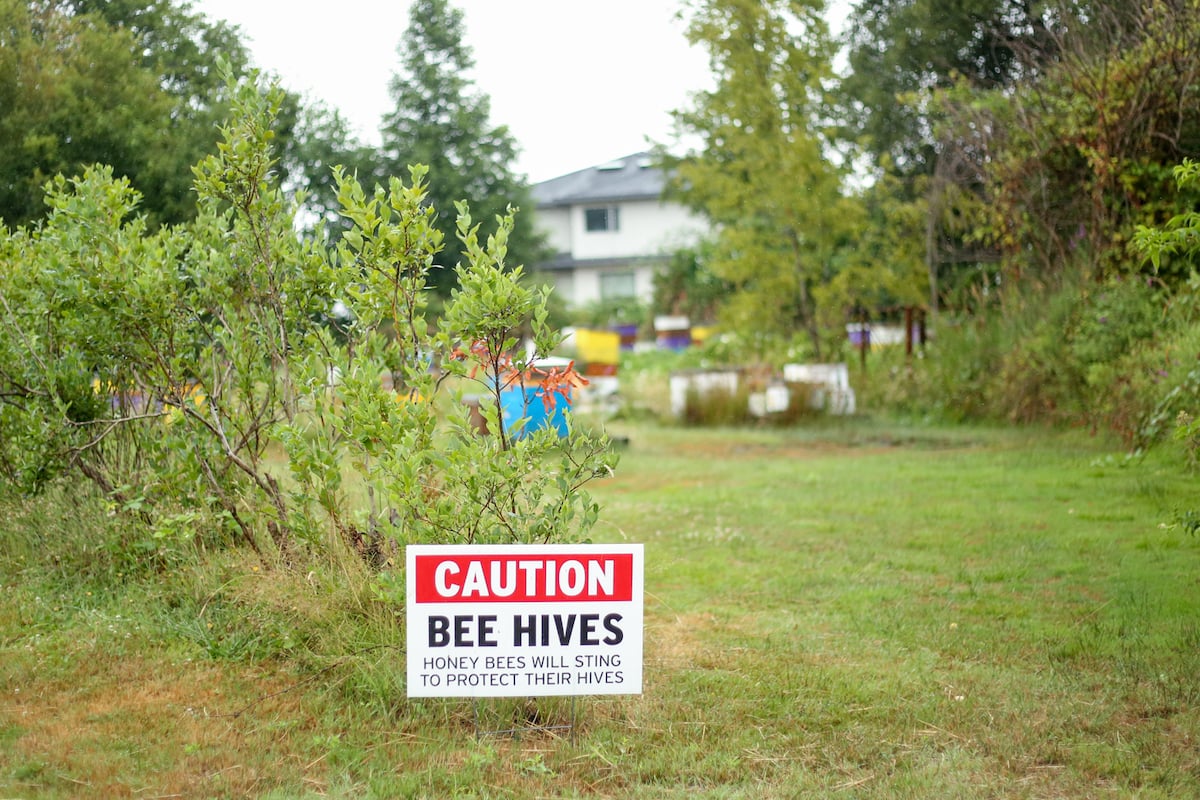
Picha, who is 57, was 17 and trimming foliage in the backyard of his first rental house when he discovered some abandoned bee boxes that his feral blackberry bushes had engulfed.
He didn’t fit in with the room full of grey hair and golf shirts at Richmond Bee Club, but he went anyway and ordered a few colonies of bees. Word got around, and Picha started to hear, “Oh, yeah, that crazy Bill! He has beehives!”
Eventually, someone asked him to take down a wasp’s nest from a tree in a friend’s backyard.
“I’m always a troubleshooter,” he tells me, “so I can look at something and think of a good way.”
This time, a good way looked like Gillette shaving cream and a garbage bag. Knowing the wasps would flee the hive when threatened, he sprayed foam on their exit point, tackled the mass with a garbage bag and cut the branch. The homeowner slipped $100 into Picha’s pocket.
“I thought, wow, this is a niche service that no one else does. And everyone’s scared.” Soon he’d extended his services to removing swarming honey bees in his neighbourhood.
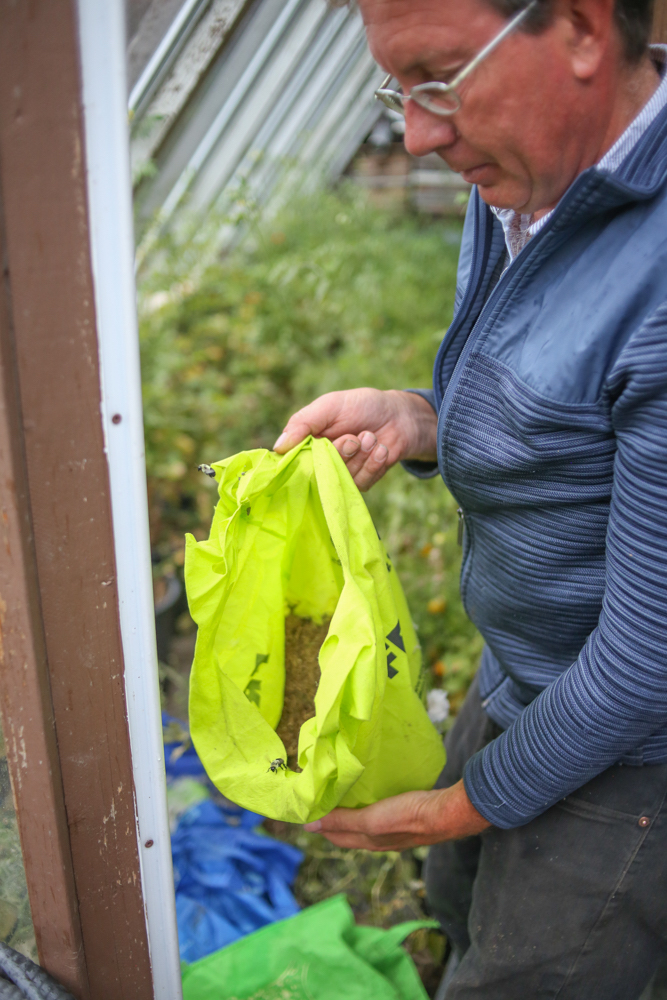
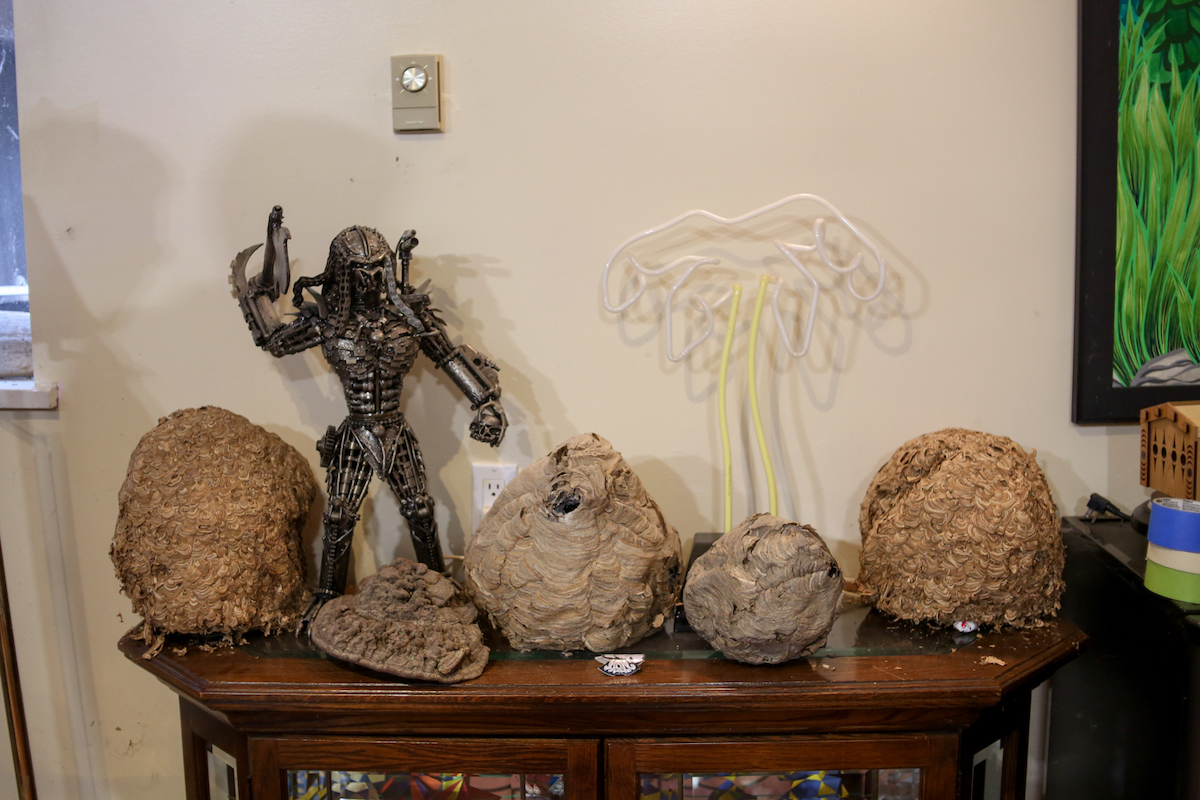
What are honey bee swarms? They aren’t as nasty as wasps, so no shaving cream takedowns are required.
Swarms are a mode of reproduction for colonies: a “splitting.” A queen bee will fly from a hive due to overpopulation or starvation, and the strongest and healthiest bees will follow to build a second hive wherever she lands.
Bees are an endangered species, so these days swarms are hot commodities. While backyard beekeepers can purchase bees from places that commercially breed them, like New Zealand and Australia, a single colony costs hundreds of dollars.
For commercial beekeepers seeking many colonies, this isn’t viable. Picha found a loophole. He says only the best hives swarm, and since swarms are feared and unwanted by most homeowners, it’s easy to turn bee-fearing citizens into win-wins by removing them for free.
“I just tell people, look, when you see a big swarm, you’re gonna phone me, right? Because a swarm is valuable to me as a beekeeper,” he explains. “It’s priceless.”
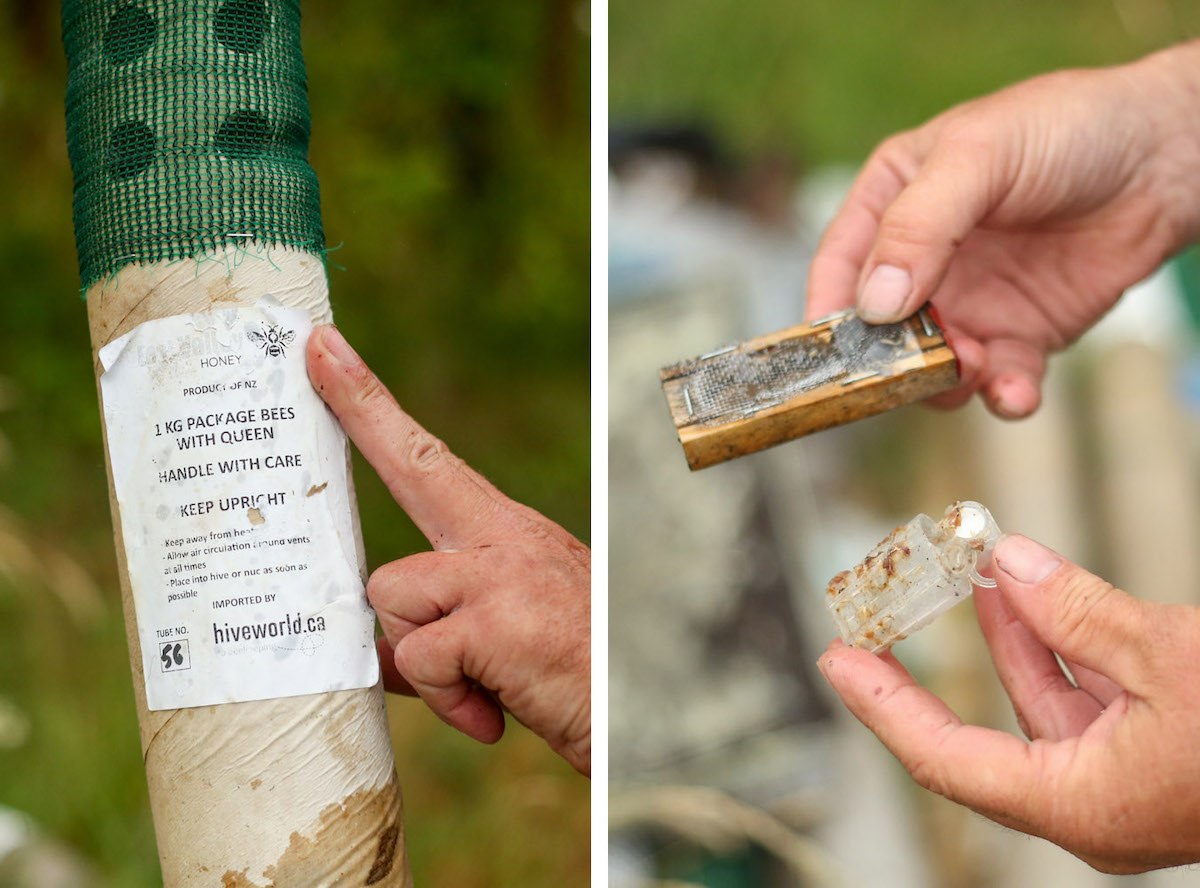
The emergency calls that Picha receives have him making trips to Abbotsford, then West Van, then Tsawwassen, zig-zagging around Vancouver. He’s been a hero to tear-stained brides and construction crane operators. If he’s lucky, he collects over 10 swarms in one day.
While most exterminators use pesticides, smoke canisters or fire, all Picha needs are his bare hands to get the queen into a box or bucket, after which the rest of the colony follows.
He’s made many DIY devices for bee-wrangling, but his “best tool” was inspired by his daughter, Atheana, when she was six years old and acting as a sidekick at his job. Impatiently waiting for some wayward bees to find the queen in Picha’s bee box, she suggested, “Daddy, use my butterfly net!”
Once, there was a swarm in Athenea’s school courtyard and it went into lockdown. Atheana called her dad to come help, but the school insisted there was an “official” emergency contact.
“So the secretary phoned… and then my phone rang,” says Picha. Soon the courtyard was packed with children, skipping class to watch Picha and his kids remove the swarm together.
“My kid’s got such, such, what do they call it, street cred? To be able to be fearless out there.”
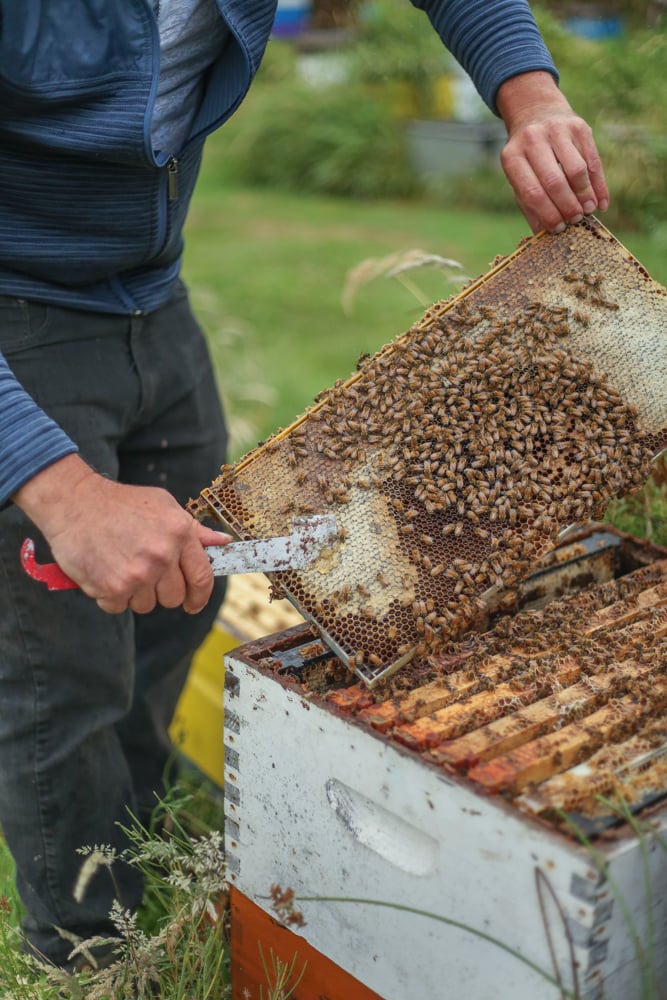
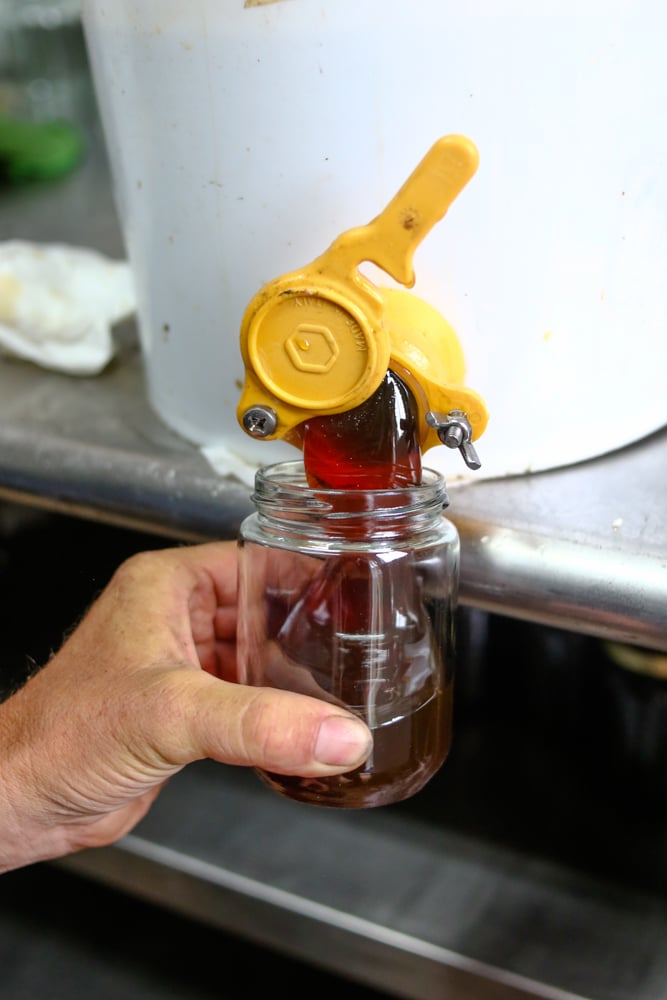
Getting stung is part of the job, but being calm is key to staying safe, Picha explains, because like dogs, bees can sense fear in humans based on the amount of carbon dioxide we release.
A few decades back, Picha ran “bee shows” at local schools, where he encouraged people to safely touch live bees. Often the most worried participants weren’t kids but “big, fully tattooed, giant biker-type guys.”
“I get people to put their hand on, and they’re just trembling,” he says. “They realize, hey, they’re warm, they’re fuzzy, they’re not going to try to attack you. It’s such a fear turning point that it’s neat to watch.”
Not that Picha hasn’t dealt with painful encounters on the job. His most uncomfortable sting was a jab to the sinus from inside his nose, causing his entire face to swell. Another doozy came from blindly reaching into a wall to remove a bumblebee nest from inside someone’s insulation.
“Bumblebees don’t have a barb, so they can sting you over and over, and they’re big, they have lots of venom,” he explains. “So, gloves off, couldn’t do it, I had to take the jacket off, couldn’t do it. I had to take the shirt off and reach in, and, like a bear, break apart and take the nest out. And my arm turned like Popeye. All my fingers were so swollen I couldn’t bend them, and my hand looked like a boxing glove.”
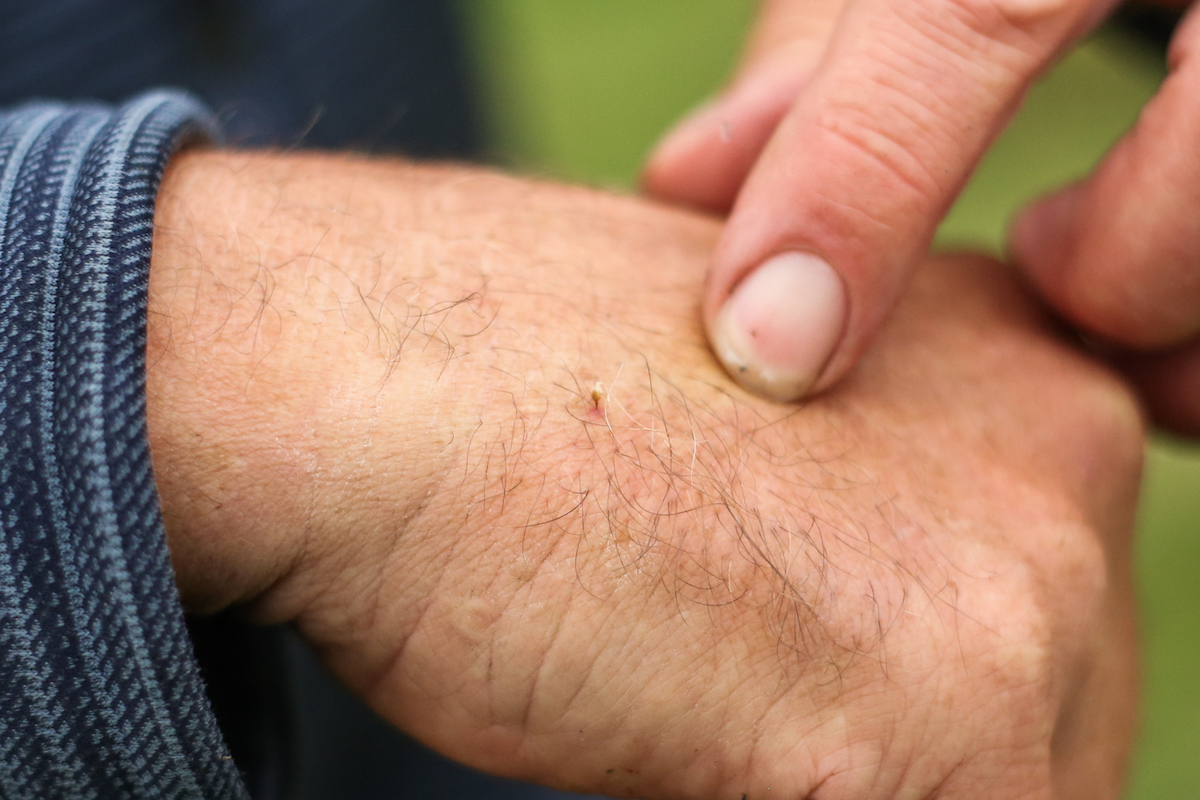
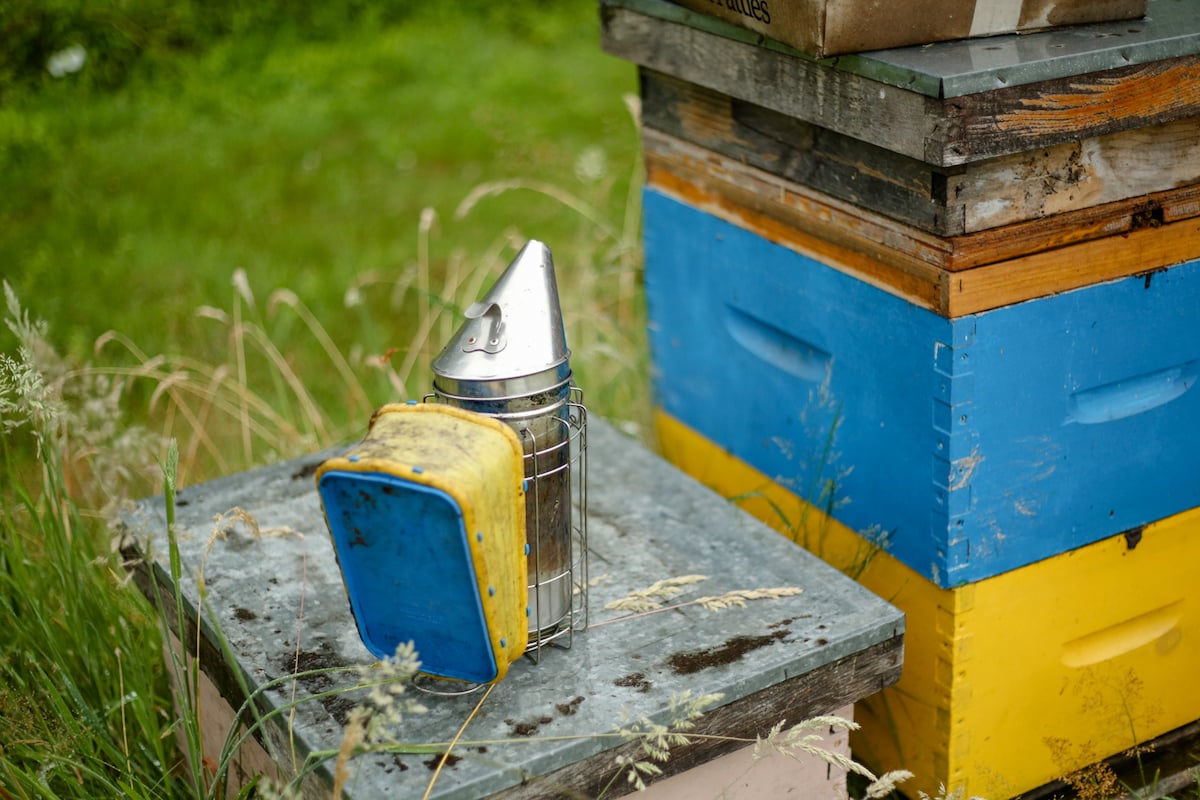
As we wander the three acres of Bill’z Beez and Berryz, I see that Picha grows an incredible range of food, including potatoes, onions, lettuce, carrots, zucchini, raspberries and strawberries. Garlic and blueberries are top sellers. His chickens provide eggs but also an attitude, “pushing each other around, causing trouble.”
Bordering the fields are blackberry and blueberry bushes waiting for summer to turn them green, the pollen of their blossoms ideal for honey-making bees. Picha plants a row of three to four hundred sunflowers along the back fence of his plot, because he loves watching their faces follow the sun as it rises and sets.
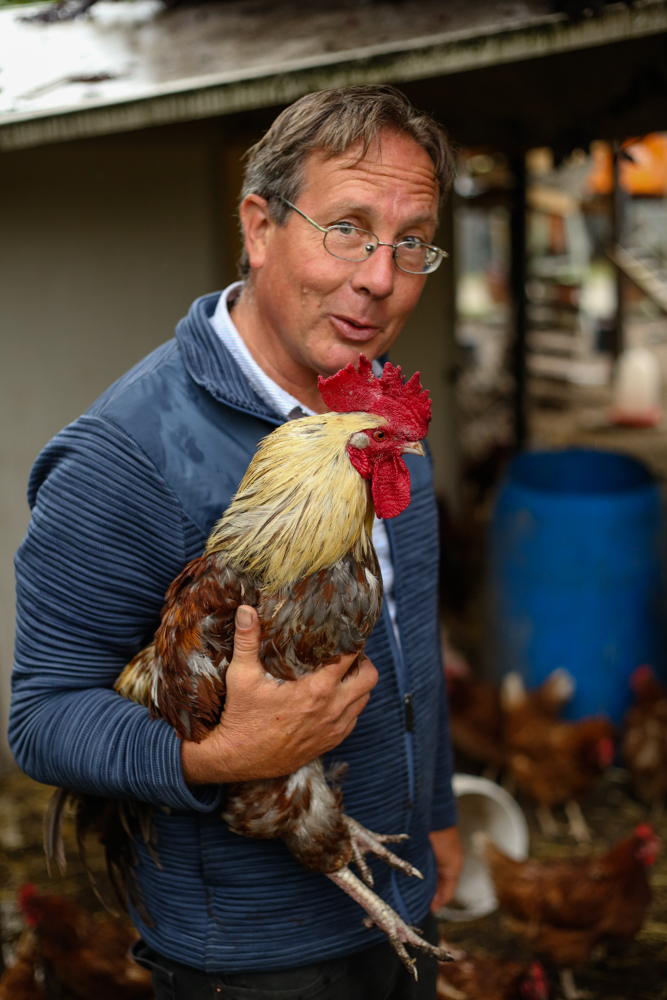
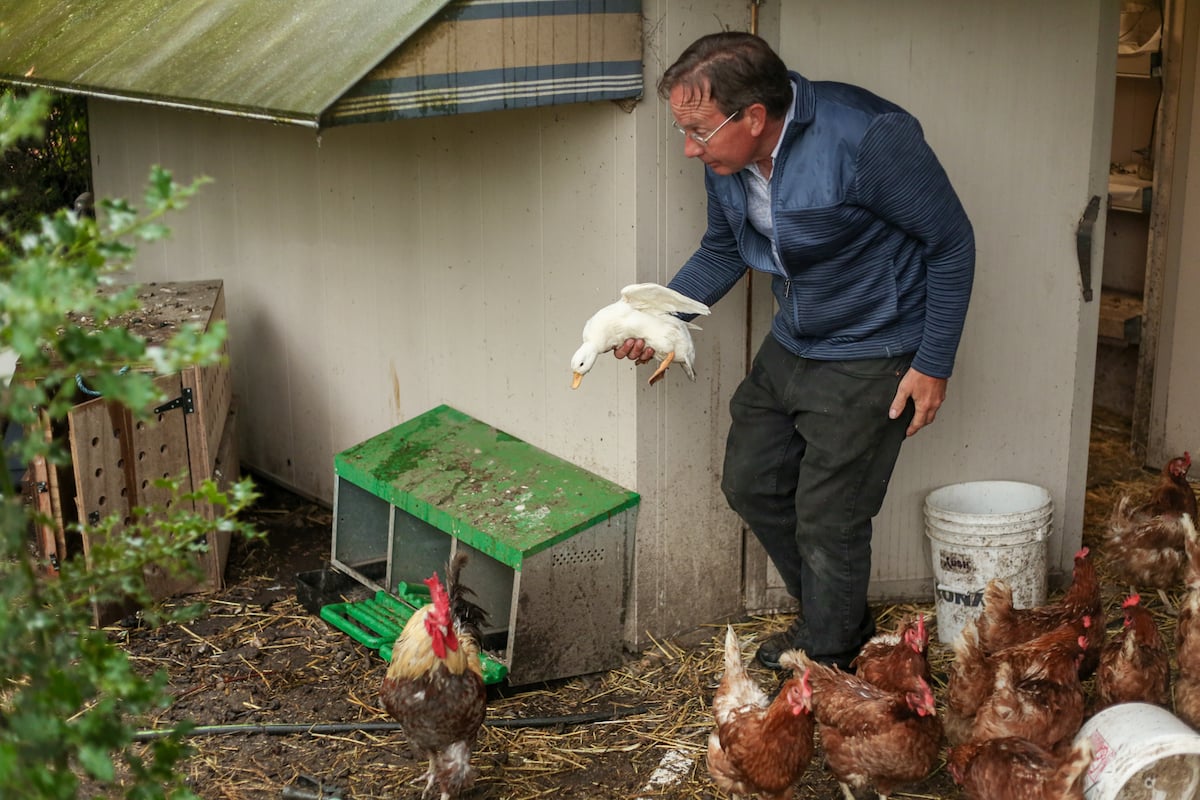

Picha can’t sell honey in bulk without expensive processing, so there was a time when his bees made rent by pollinating outside farms, a paid service. The big three types of farms that beg for bees are raspberry, blueberry and cranberry.
Farmers will pay $150 per hive for two weeks of pollination, and commercial beekeepers are booked years in advance. Beekeepers follow blossoms, to keep their bees working through spring and summer.
It’s a line of work that Picha has abandoned. He came to realize that the pesticides and other chemicals farmers use were cumulatively harming his bees.
“It’s not enough to kill them on the spot. But when they bring a little bit, a little bit more, a little bit more, than the colony just… just can’t make it.”
Picha points out that in surrounding blueberry farms, the ditch line is cluttered with weeds and grass, but underneath the plants it’s “scorched earth, bare,” from the chemicals used to control pests. He says that pesticides are one reason it’s become normal for commercial beekeepers to lose 40 per cent of their colonies per year.
It’s not normal to lose everything. That’s what happened to Picha this year.
“Eighty hives gone,” he sighs. “And a lot of other people lost everything as well.”
Most beekeepers that Picha knows gave up the trade about 20 years ago, when hive loss began spiking. But what’s causing it? Chemicals? Extermination by homeowners? Climate change?
“Varroa mite,” Picha cuts me off grimly. “It’s a mite that has no eyes and no wings, it just crawls. And it’s spread all around the world. Hawaii, Papua New Guinea, New Zealand, Australia, everybody’s got it. Somehow or other, this thing with no wings and no eyes is able to infiltrate every island and continent.”
Varroa mites feed on bee larvae, reproducing alongside it, and when the larvae break from their casings, mite offspring scatter and settle with new larvae. There are treatments, which Picha has used extensively, but it’s impossible to stop bees from associating with other colonies — impossible to stop it spreading.
“Yeah, the mite’s the worst one. And then there’s another one called colony collapse disorder, which no one can figure out, and… the bees are just gone. There’s pollen, there’s honey, all the food, everything that it needs is there — but there’s just no bees.”
Picha pries open a bee box with a crowbar, noting how easily it should open if bees were bustling inside, warming the honey and wax. This time he has to use extra muscle.
Inside, there is a bounty of honey clinging to every frame, an orange dried-up mite treatment strip, and otherwise… corpses. Picha looks down on the dead insects, grieving.
“I mean, it happens. It just, it happens. It’s not anything that I did. It’s just… I was too hard on them last year.” He pulls out frames of honey that should have kept the bees fed. “It’s not like I neglected them. It’s just heartbreaking.”
University researchers frequent Picha’s farm to conduct studies on his hives, because the lack of chemical use makes Bill’z Beez a fantastic control. They’re just as puzzled as he is over the losses, but Picha’s confident he can rebuild his empire. He’s ordered 30 fresh colonies, and he’ll get calls all summer about swarms to collect.
“Why stick with it?” he asks. “No bees, no food. It’s that easy. If I get a bee colony here to pollinate my blueberries, I get so many more healthy, jumbo fat blueberries. And all my other vegetables, everything, the grapes! Everything does better.”
A farm this size would need nine hives of bees to adequately pollinate all of the crops. Last year, Picha had 120.
“The amount of fruit on my little farm is just crazy.”
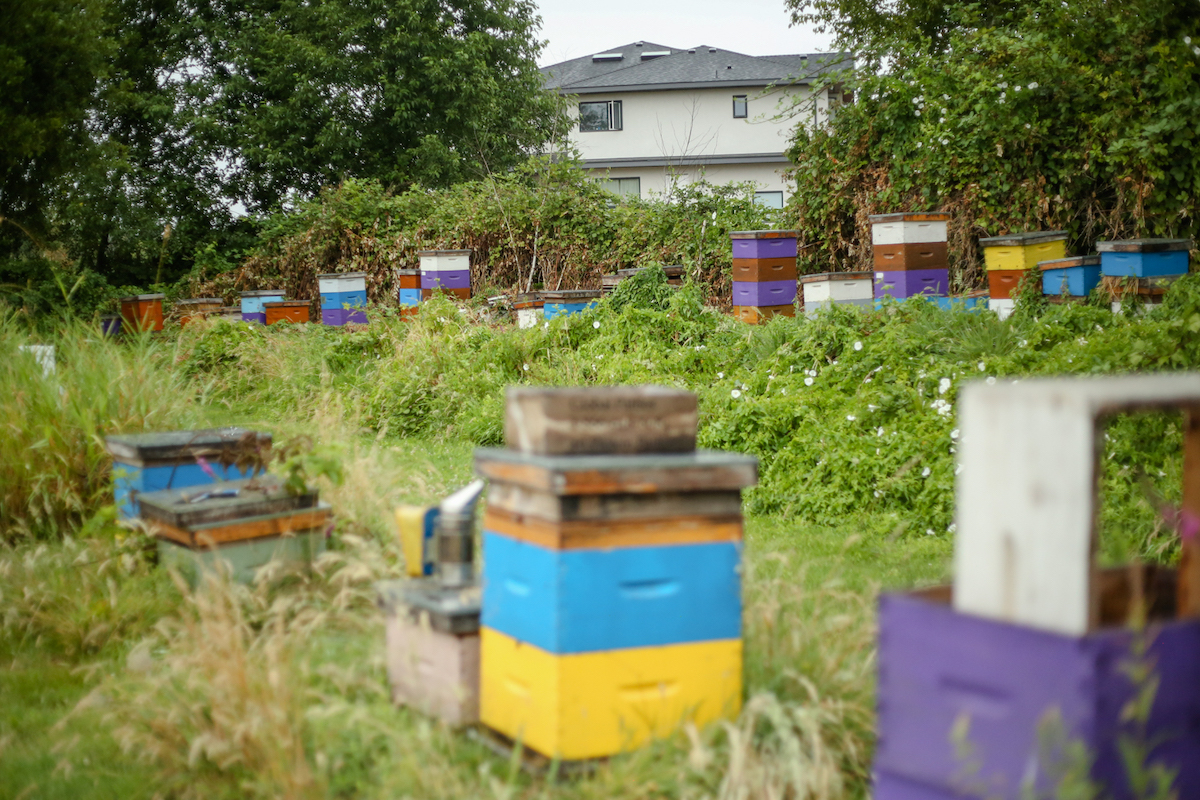
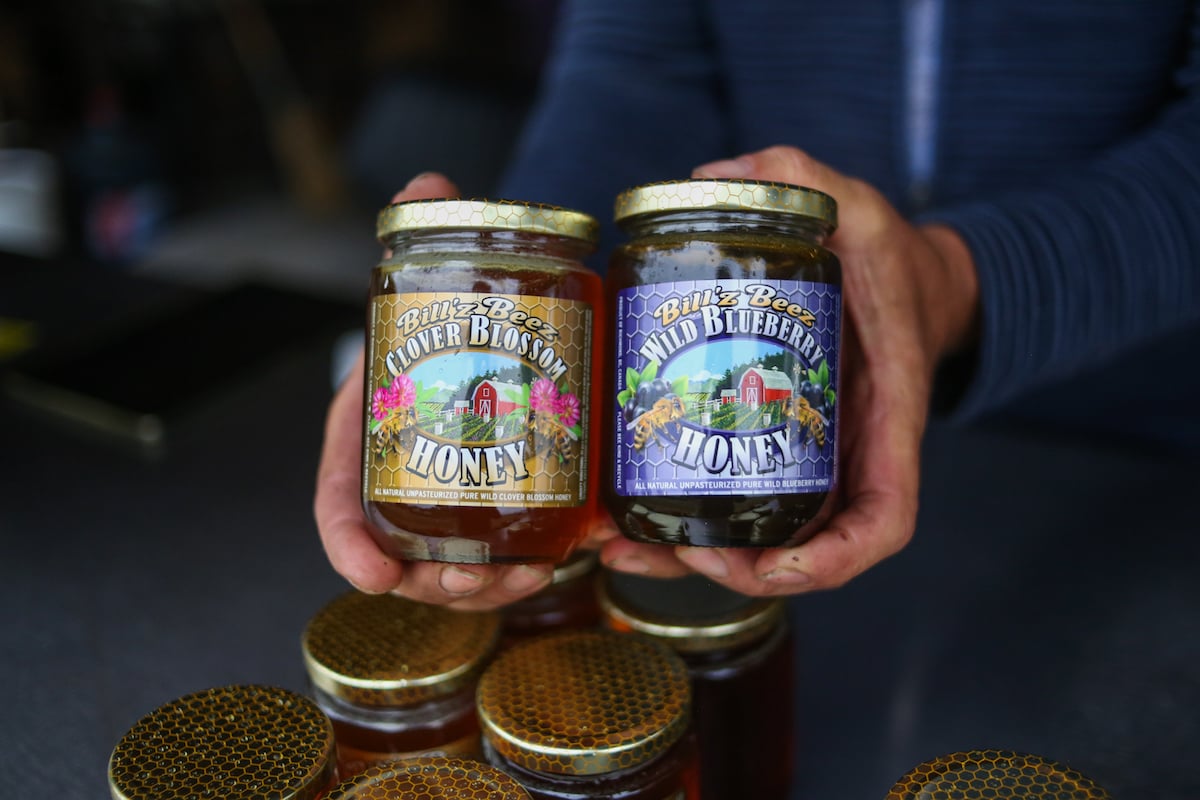
That fruit is what keeps people visiting Bill’z Beez and Berryz every summer. Picha’s main income these days comes from opening up to the community, allowing families, friends, even birthday parties to pick produce for purchase.
“There’s been countless times where people say, ‘I couldn’t find any potatoes on the plants, I guess they’ve all been picked.’” Picha has a glint in his eye, hoping I will guess the punchline. “They don’t know that potatoes grow underground!
“And then to gather and pull off some romaine lettuce, and pull out some onions, and go into the greenhouse and pick some peppers, and, they’re just like, glowing!”
This summer, like the last one, Picha has set up picnic tables, tractors for photo ops, and baby chicks for kids to play with. He gives tours, helps people find plants, and teaches about beekeeping.
And when the hundreds of sunflowers turn their heads to follow the sun, sinking under the horizon, Picha will stay in the fields until the last person has left.
“If people are here, and they come up and they don’t have purple teeth, I send them back down to eat more. You’re going to eat one pound? Who cares! They’re gonna fall on the ground. So, go eat as much as you want. And then fill the bucket, and pull some garlic and dig out some potatoes, and make a salad with all the stuff that you want for tonight.
“And then come back next week! I’m not going to be a successful businessman, but it sure is a good, enjoyable way to spend a weekend.” ![]()
Read more: Labour + Industry, Environment




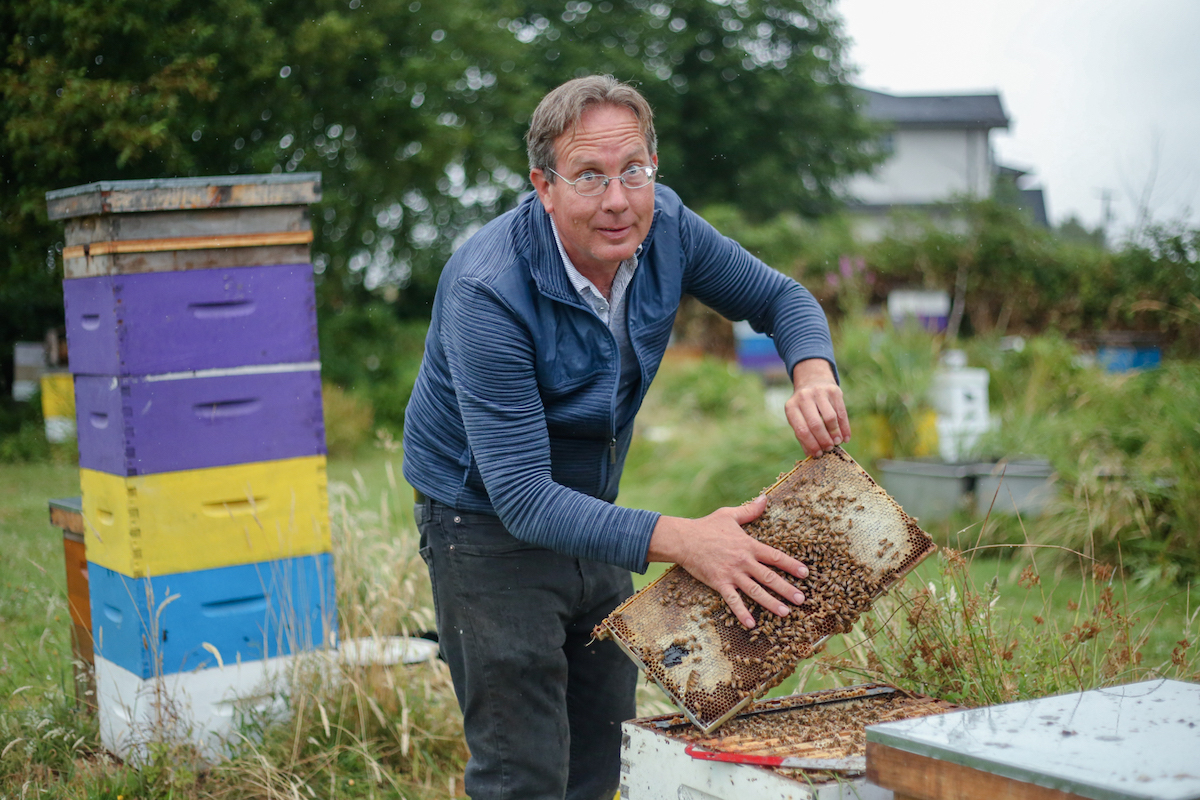












Tyee Commenting Guidelines
Comments that violate guidelines risk being deleted, and violations may result in a temporary or permanent user ban. Maintain the spirit of good conversation to stay in the discussion and be patient with moderators. Comments are reviewed regularly but not in real time.
Do:
Do not: